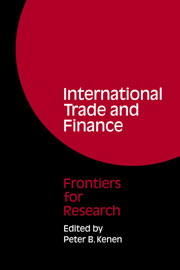Book contents
- Frontmatter
- Contents
- List of Contributors
- Preface
- PART I TRADE, PROTECTION, AND DOMESTIC PRODUCTION
- Testing Trade Theories
- The Costs and Consequences of Protection: A Survey of Empirical Work
- Trade Policies and Economic Development
- Discussion
- PART II ECONOMETRIC MODELS OF TRADE AND PAYMENTS
- Part III PAYMENTS ADJUSTMENT AND THE MONETARY SYSTEM
- PART IV AN OVERVIEW AND AGENDA
- Glossary of Frequently Used Acronyms
- Author Index
Trade Policies and Economic Development
Published online by Cambridge University Press: 05 November 2011
- Frontmatter
- Contents
- List of Contributors
- Preface
- PART I TRADE, PROTECTION, AND DOMESTIC PRODUCTION
- Testing Trade Theories
- The Costs and Consequences of Protection: A Survey of Empirical Work
- Trade Policies and Economic Development
- Discussion
- PART II ECONOMETRIC MODELS OF TRADE AND PAYMENTS
- Part III PAYMENTS ADJUSTMENT AND THE MONETARY SYSTEM
- PART IV AN OVERVIEW AND AGENDA
- Glossary of Frequently Used Acronyms
- Author Index
Summary
The stagnation of international trade between the world wars gave rise, with a lag, to a reconsideration of pre-1914 classical orthodoxy regarding the role of trade policies on economic development. Even as Nurkse, Prebisch, and Myrdal wrote, however, the post–World War II trade boom was gathering momentum. By the 1960s, it was clear that such a boom was not a passing cyclical phenomenon, and, not surprisingly, a substantial neoclassical revival followed in the applied trade and development literature, although pure trade theory was becoming increasingly agnostic regarding free trade. This paper will survey primarily what has been written since 1960 on the impact of trade policies of less developed countries on their growth and development. It will, on the whole, leave aside the literature on trade policies of developed countries.
What is to be included among “trade policies”? Pride of place will be given to those influencing significantly the level and composition of exports of goods and services, although those associated with inducing import substitution beyond the levels dictated by market forces will also be discussed. Most less developed countries can influence their long-run import level by encouraging or discouraging exports, while they are unlikely to expand exports just by increasing their imports, a simple point ignored by some import-liberalization attempts of the 1960s. In other words, although one can imagine increases in imports triggering mechanisms that will lead to higher exports, the lags and frictions of that process are likely to be substantially greater than those involved between an export rise and the ensuing import expansion.
- Type
- Chapter
- Information
- International Trade and FinanceFrontiers for Research, pp. 93 - 150Publisher: Cambridge University PressPrint publication year: 1976
- 5
- Cited by



